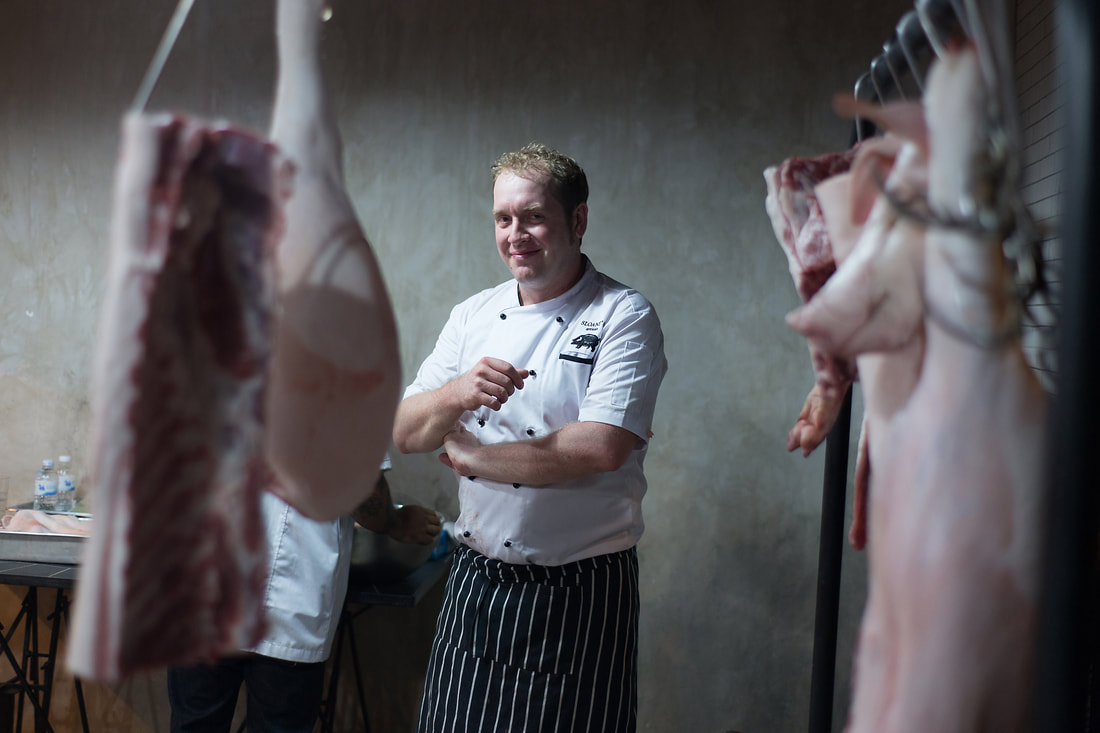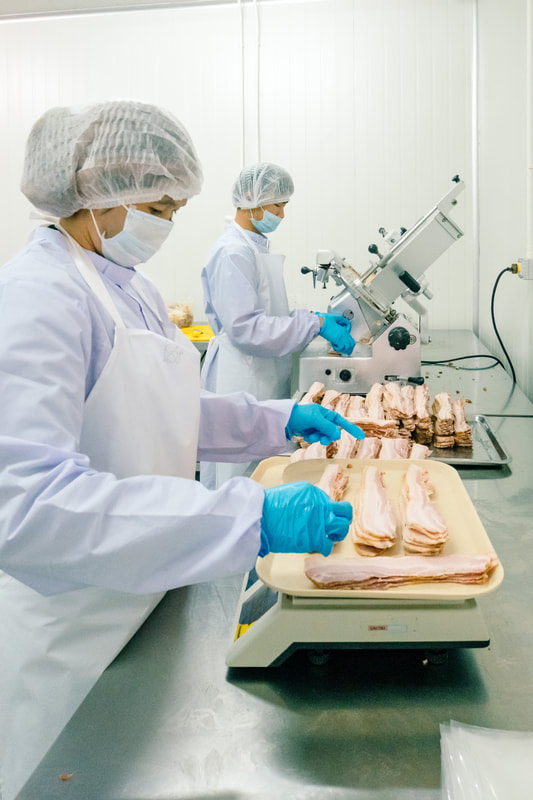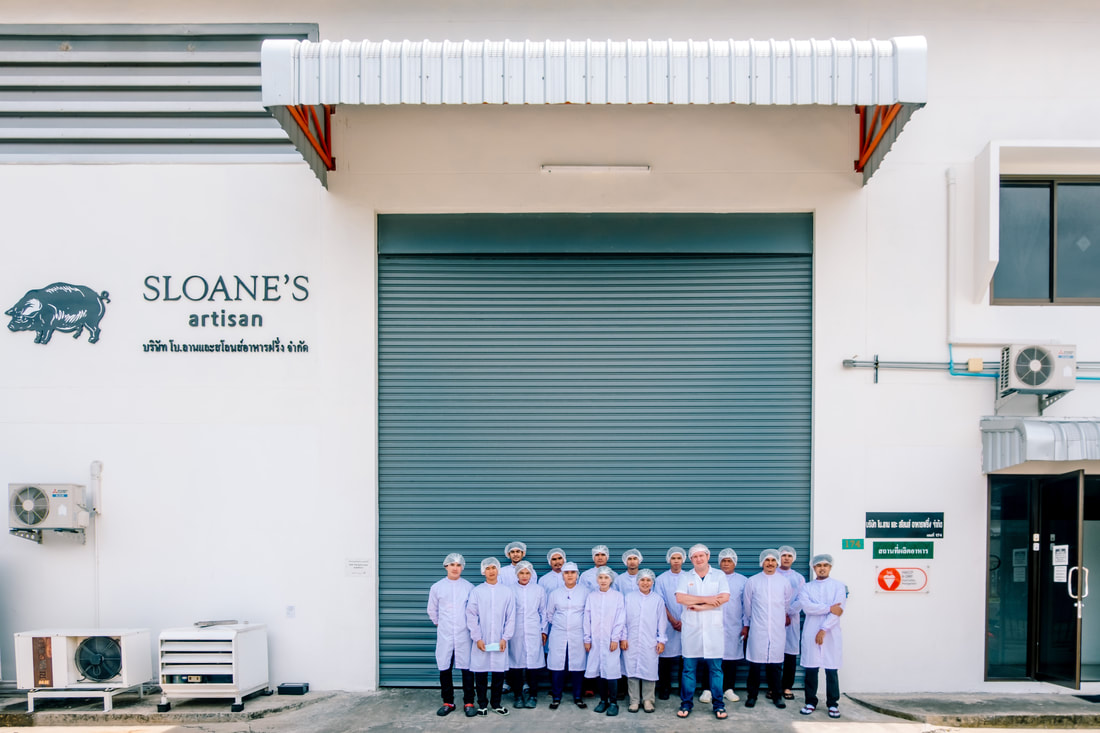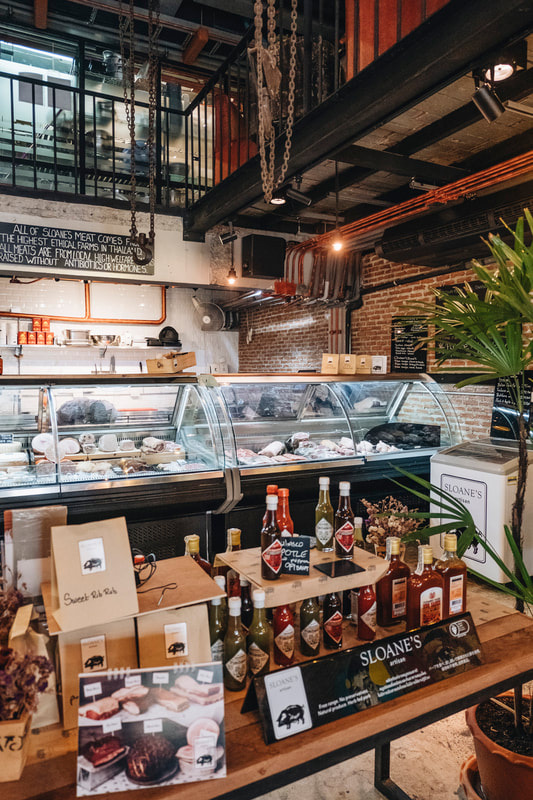Starting with a single pig ten years ago, selling his products in local farmers’ markets and to friends, Joe Sloane has grown his food business into one of Thailand’s leading and most recognizable suppliers of artisanal meat products.
The line-up includes sausages, bacon, hams, pies, burgers and a range of aged goods like salamis and chorizo. Today, ‘Sloane’s’ gets through four tons of meat a week, all from “high welfare” sources dotted around the country which UK-born Joe visits on a regular basis.
Most of his beef, for example, is from farms in Korat, while the pigs are sourced from a family cooperative in Ratchburi, and chickens from Khao Yai. Other suppliers are based in Sisaket, Chantaburi and Chiang Rai. All supplies are processed by 40-strong staff in the company’s Bangkok factory.
In addition to supermarkets popular with Thailand’s expat community, Joe supplies a number of leading hotels such as Hyatt, Marriott, St Regis, Kempinski, Anantara, Sheraton and the Minor Group as well as outlets like Starbucks.
In fact, it was Starbucks that helped to give his business a major boost when it added Sloane’s Cumberland sausages with Gouda cheese and egg on its menu as a breakfast special. The product was a surprise hit and almost overnight his Cumberlands went main stream.
Sloane’s goods are also available in restaurants in Luang Prabang, Laos, while plans to export to Singapore were shelved because the island republic only allow heat-treated pork products. Here in Thailand, some restaurants now make a point of highlighting the ‘Joe Sloane’s’ products as a sign of superior quality menu items.
To make his recently introduced range of pies, which include steak and kidney, steak and stout, mince and onion, chicken and ham, chicken and asparagus, traditional pork, cranberry and gala, Joe uses a traditional pie making machine from John Hunt of Bolton, a huge 80kg cast-iron contraption, some 60 years old, which he brought into Thailand in sections from the UK.
In terms of price, Joe reckons his products are roughly 20% more than the competition – “typically 250 baht against 290 baht for Sloane’s and 600 baht against 500 baht for other products.”
The line-up includes sausages, bacon, hams, pies, burgers and a range of aged goods like salamis and chorizo. Today, ‘Sloane’s’ gets through four tons of meat a week, all from “high welfare” sources dotted around the country which UK-born Joe visits on a regular basis.
Most of his beef, for example, is from farms in Korat, while the pigs are sourced from a family cooperative in Ratchburi, and chickens from Khao Yai. Other suppliers are based in Sisaket, Chantaburi and Chiang Rai. All supplies are processed by 40-strong staff in the company’s Bangkok factory.
In addition to supermarkets popular with Thailand’s expat community, Joe supplies a number of leading hotels such as Hyatt, Marriott, St Regis, Kempinski, Anantara, Sheraton and the Minor Group as well as outlets like Starbucks.
In fact, it was Starbucks that helped to give his business a major boost when it added Sloane’s Cumberland sausages with Gouda cheese and egg on its menu as a breakfast special. The product was a surprise hit and almost overnight his Cumberlands went main stream.
Sloane’s goods are also available in restaurants in Luang Prabang, Laos, while plans to export to Singapore were shelved because the island republic only allow heat-treated pork products. Here in Thailand, some restaurants now make a point of highlighting the ‘Joe Sloane’s’ products as a sign of superior quality menu items.
To make his recently introduced range of pies, which include steak and kidney, steak and stout, mince and onion, chicken and ham, chicken and asparagus, traditional pork, cranberry and gala, Joe uses a traditional pie making machine from John Hunt of Bolton, a huge 80kg cast-iron contraption, some 60 years old, which he brought into Thailand in sections from the UK.
In terms of price, Joe reckons his products are roughly 20% more than the competition – “typically 250 baht against 290 baht for Sloane’s and 600 baht against 500 baht for other products.”
Name: Joe Sloane
Family: Wife Katie, a teacher at Bangkok Patana School, daughter Scarlett, two dogs and three chickens.
Employment background: Worked as a chef since the age of 16 across various countries, including over a decade in Michelin starred restaurants and five-star hotels.
What do you do here – and how long have you been in your present job?
Having left the chef trade about 10 years ago, I set up my own wholesale butchery supplying the country’s top hotels and restaurants, as well as supermarkets with artisan meat products made from high welfare Thai livestock.
How many products do you make nowadays? We have about 300 products in total, but many are custom made products for chefs.
Where do you live? On the border of Bangkok and Samut Prakan. I’ve always enjoyed living on the outskirts of the city. Its greener, better street food and more of a community feel compared to the city centre.
How long in Thailand? Over 12 years now.
What brought you here? Originally my wife's job at Bangkok Patana School. As a chef it was an exciting opportunity to discover another cultures food so jumped at the chance of coming to Thailand. We’d been to a few places around Asia before, but never Thailand.
What’s keeping you in Thailand? So much. Obviously the business, but also the food, the people, my daughter’s education, the weather, so many things.
Did you ever think as a young man that you’d end up as an independent butcher in SE Asia?
No, it was all about restaurants and Michelin stars when I was younger. My chef career was everything, but it's one of the best moves I’ve ever made. My real passion was always about food, so being a food producer means I’m involved directly in food and don’t have to deal with the rest of the restaurant issues chefs deal with and can concentrate on the food part.
What’s the best part of your job?
Working closely with the full chain from the farm all the way to the end product is great, but it would have to be happy customers. Getting comments about how people have missed certain foods and have finally found a decent sausages/ bacon/ chicken etc is why I set the company up.
And the worst?
Unhappy customers. I’m pleased to say we get very few complaints, but we produce so much now, we do get the occasional message from an unhappy customer.
Usually it's down to personal preference, one person wants a sausage leaner, the next wants it fattier. We do what we can, but it's impossible to keep everyone happy.
Do you ever feel sentimental about pigs or indeed any other animals, or is all just part of your job?
Not sentimental, but it's a big part of the audits I do at farms and abattoirs in making sure the animals are treated with respect. The farms we work with have a deep care for their animals and like to make sure that care goes through to the end and they get slaughtered humanely too.
How good are your sausages compared to those in M&S or Sainsbury back in the UK?
Ours are more of a butcher’s style sausage and we aim to supply the same quality as a top UK butcher rather than a large supermarket range. Many supermarket sausages are made very cheaply.
How many slang words can you think of for a sausage?
Hahaha, too many to think of. Some of which are probably not printable.
Family: Wife Katie, a teacher at Bangkok Patana School, daughter Scarlett, two dogs and three chickens.
Employment background: Worked as a chef since the age of 16 across various countries, including over a decade in Michelin starred restaurants and five-star hotels.
What do you do here – and how long have you been in your present job?
Having left the chef trade about 10 years ago, I set up my own wholesale butchery supplying the country’s top hotels and restaurants, as well as supermarkets with artisan meat products made from high welfare Thai livestock.
How many products do you make nowadays? We have about 300 products in total, but many are custom made products for chefs.
Where do you live? On the border of Bangkok and Samut Prakan. I’ve always enjoyed living on the outskirts of the city. Its greener, better street food and more of a community feel compared to the city centre.
How long in Thailand? Over 12 years now.
What brought you here? Originally my wife's job at Bangkok Patana School. As a chef it was an exciting opportunity to discover another cultures food so jumped at the chance of coming to Thailand. We’d been to a few places around Asia before, but never Thailand.
What’s keeping you in Thailand? So much. Obviously the business, but also the food, the people, my daughter’s education, the weather, so many things.
Did you ever think as a young man that you’d end up as an independent butcher in SE Asia?
No, it was all about restaurants and Michelin stars when I was younger. My chef career was everything, but it's one of the best moves I’ve ever made. My real passion was always about food, so being a food producer means I’m involved directly in food and don’t have to deal with the rest of the restaurant issues chefs deal with and can concentrate on the food part.
What’s the best part of your job?
Working closely with the full chain from the farm all the way to the end product is great, but it would have to be happy customers. Getting comments about how people have missed certain foods and have finally found a decent sausages/ bacon/ chicken etc is why I set the company up.
And the worst?
Unhappy customers. I’m pleased to say we get very few complaints, but we produce so much now, we do get the occasional message from an unhappy customer.
Usually it's down to personal preference, one person wants a sausage leaner, the next wants it fattier. We do what we can, but it's impossible to keep everyone happy.
Do you ever feel sentimental about pigs or indeed any other animals, or is all just part of your job?
Not sentimental, but it's a big part of the audits I do at farms and abattoirs in making sure the animals are treated with respect. The farms we work with have a deep care for their animals and like to make sure that care goes through to the end and they get slaughtered humanely too.
How good are your sausages compared to those in M&S or Sainsbury back in the UK?
Ours are more of a butcher’s style sausage and we aim to supply the same quality as a top UK butcher rather than a large supermarket range. Many supermarket sausages are made very cheaply.
How many slang words can you think of for a sausage?
Hahaha, too many to think of. Some of which are probably not printable.
| Who’s your biggest competitor? I don’t feel I have many really. There are a few that have come and gone over the years and a few still on the market that do a similar style to me, but we are quite different from our competitors. The other smaller butchers don’t have strict certification that we do and without the FDA and GMP/HACCP certificates the larger companies can’t use them. They prefer to stick to doing what they do, and do it well. Then the larger companies tend to just make the mass produced sausages as they sell better than my style. By sticking to only using the best quality meats from high welfare farms and being certified by the British Standards Institute it puts us out on our own. The few competitors I have are all friends too and we have a good friendly relationship. We all share contacts and suppliers with each other and the top butchers like Eden Deli and Accidental Butcher have helped me source items I need, as have I for them many times over the years. It's much better like this for all of us, rather than just being rivals. |
| What do you think of the sausages that we see all too often ‘floating’ in a hotel breakfast buffet? Hahaha, not my style at all, but many chefs are forced to use then due to the low budget they get for their breakfasts. Thankfully many hotels are moving away from these and we now supply many hotels across the country that are wanting to ensure they sell a better product than the ‘glistening weiners’ spinning round in the convenience store across the road. The days of those terrible hotel breakfasts are certainly slowly going, although it’s still a shock at times when seeing top hotels still use the terrible fake sausages rather than offering a better product. Do you like ‘Issan’ sausages, despite not knowing what goes into them? I do, I love the local sausages, whether it’s a spicy Sai Oua or a sour Sai Grok Issan, both are amazing in their own way. Can you see the time when Thais will eat as many sausages and pies as an average Brit? Western food in general is definitely growing throughout Thai society and Thais are have a much better understanding of western food now compared to a decade ago, so sales of good quality western food is a fast growing market, but not sure it will ever be as much as a Brit. It’s comfort for us. |
What are your favorite restaurants in Bangkok?
Bangkok has such a busy restaurant scene it’s tough to keep up. But places I go back to regularly are - Err on Maharat Road; Bo.lans casual eatery, which serves Bo & Dylan’s great Thai food but in a casual setting; Olta on Suan Plu, where Chef Jamie does some great food using amazing products.
But living out of the city centre my favourite restaurant currently is Pued Kung Maenam on Soi Bearing, a great little Thai seafood place making their own curry pastes by hand and cooking some amazing fresh seafood.
Do you ever order sausages or pies in a Bangkok restaurant?
Rarely now. Having set up our new range of pies recently I went round trying a lot of pies to test the competition. When eating out I usually choose something very different to my daily routine and usually eat fish.
Most interesting person you’ve ever met in Thailand?
Not really Thailand, but when first trying to set up Sloane’s (while most people thought I was crazy and no one would be interested in paying a slightly higher price or using local meats) I came across Sharky’s in Myanmar. At the time I was having doubts about whether it would work in Thailand, and here was a place making their own sausages and cheeses etc in a country that didn’t even have ATMss and credit cards. It gave me some encouragement that if it can work in Myanmar it must be able to work in a city like Bangkok.
Beer or wine?
Depends on my mood and what I’m eating. I love wine, but a beer along with spicy food after a long day is the perfect match.
Beef, pork or fish?
This sounds bad coming from a butcher ….but fish!
Best compliment you’ve ever received regarding your food?
“That was so good, I didn’t need Brown Sauce” Grant, a Northerner.
What’s next?
We set up two major new ranges this year with both our dry-aged Thai Angus Beef products and our pies. The new frozen range of burgers and pies are flying off the shelves in Villa Market at the moment, so that's keeping us busy. But I’ve already started on a range of aged goods such as Salamis, Saussicons, Chorizo, Coppa, and Besoala etc and plan to grow this next year.
Other than this next year is all about fine tuning a few items and the business to help with the growth. We’ve grown a lot over the years, but have no plans to become too big and lose the thing that makes us different to the larger companies we compete against.
Bangkok has such a busy restaurant scene it’s tough to keep up. But places I go back to regularly are - Err on Maharat Road; Bo.lans casual eatery, which serves Bo & Dylan’s great Thai food but in a casual setting; Olta on Suan Plu, where Chef Jamie does some great food using amazing products.
But living out of the city centre my favourite restaurant currently is Pued Kung Maenam on Soi Bearing, a great little Thai seafood place making their own curry pastes by hand and cooking some amazing fresh seafood.
Do you ever order sausages or pies in a Bangkok restaurant?
Rarely now. Having set up our new range of pies recently I went round trying a lot of pies to test the competition. When eating out I usually choose something very different to my daily routine and usually eat fish.
Most interesting person you’ve ever met in Thailand?
Not really Thailand, but when first trying to set up Sloane’s (while most people thought I was crazy and no one would be interested in paying a slightly higher price or using local meats) I came across Sharky’s in Myanmar. At the time I was having doubts about whether it would work in Thailand, and here was a place making their own sausages and cheeses etc in a country that didn’t even have ATMss and credit cards. It gave me some encouragement that if it can work in Myanmar it must be able to work in a city like Bangkok.
Beer or wine?
Depends on my mood and what I’m eating. I love wine, but a beer along with spicy food after a long day is the perfect match.
Beef, pork or fish?
This sounds bad coming from a butcher ….but fish!
Best compliment you’ve ever received regarding your food?
“That was so good, I didn’t need Brown Sauce” Grant, a Northerner.
What’s next?
We set up two major new ranges this year with both our dry-aged Thai Angus Beef products and our pies. The new frozen range of burgers and pies are flying off the shelves in Villa Market at the moment, so that's keeping us busy. But I’ve already started on a range of aged goods such as Salamis, Saussicons, Chorizo, Coppa, and Besoala etc and plan to grow this next year.
Other than this next year is all about fine tuning a few items and the business to help with the growth. We’ve grown a lot over the years, but have no plans to become too big and lose the thing that makes us different to the larger companies we compete against.





 RSS Feed
RSS Feed
















